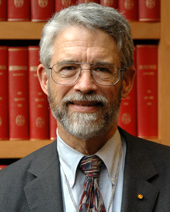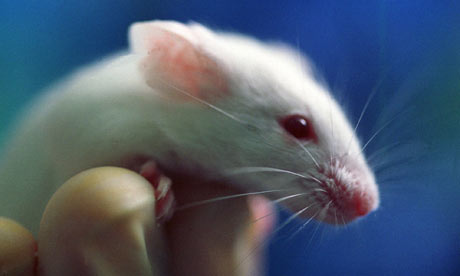 Continued study of an approximately 40,000 year old finger bone from Siberia has identified a previously unknown type of human — one that may have interbred with the ancestors of modern-day Melanesian people.
Continued study of an approximately 40,000 year old finger bone from Siberia has identified a previously unknown type of human — one that may have interbred with the ancestors of modern-day Melanesian people.
The fossil scrap — just the tip of a juvenile female’s finger — was discovered in 2008 during excavations of Denisova cave in Siberia’s Altai Mountains. Anatomically, it looks like it could have belonged to a Neanderthal or a modern human.
Fossil Finger DNA Points to New Type of Human
Obama administration issues science guidelines at last
 The White House on Friday released its long-delayed scientific integrity guidelines, intended to ban political interference in science. President Barack Obama campaigned on scientific integrity after scientists and others complained that Bush administration officials distorted scientific work and limited access to information on a variety of issues ranging from climate change to lead poisoning and mountaintop removal mining.
The White House on Friday released its long-delayed scientific integrity guidelines, intended to ban political interference in science. President Barack Obama campaigned on scientific integrity after scientists and others complained that Bush administration officials distorted scientific work and limited access to information on a variety of issues ranging from climate change to lead poisoning and mountaintop removal mining.
Shortly after Obama took office, he issued a memorandum in March 2009 calling for scientific integrity guidelines. He gave John Holdren, the director of the White House Office of Science and Technology, until that July, but the deadline kept slipping until Friday.
Nasa warns solar flares from 'huge space storm' will cause devastation
 National power grids could overheat and air travel severely disrupted while electronic items, navigation devices and major satellites could stop working after the Sun reaches its maximum power in a few years.
National power grids could overheat and air travel severely disrupted while electronic items, navigation devices and major satellites could stop working after the Sun reaches its maximum power in a few years.
Senior space agency scientists believe the Earth will be hit with unprecedented levels of magnetic energy from solar flares after the Sun wakes “from a deep slumber” sometime around 2013, The Daily Telegraph can disclose.
Universe might hold three times more stars than previously thought
 It's a cosmic embarrassment of riches – the universe appears to hold three times the number of stars many astronomers might have estimated only a year ago. That's the implication a pair of scientists has drawn after measuring eight huge elliptical galaxies that they selected from two vast galaxy clusters located between 53 million to 321 million light-years from Earth.
It's a cosmic embarrassment of riches – the universe appears to hold three times the number of stars many astronomers might have estimated only a year ago. That's the implication a pair of scientists has drawn after measuring eight huge elliptical galaxies that they selected from two vast galaxy clusters located between 53 million to 321 million light-years from Earth.
With as many as 200 billion galaxies in the observable universe, each with hundreds of billions of stars, the result – if it holds up – implies an enormous number of additional burning gas balls out there, with intriguing implications for explanations of how stars and galaxies form and evolve, researchers say.
Life as we don't know it' discovery could prove existence of aliens
 NASA has sent the internet into a frenzy after it announced an "The discovery could prove the theory of "shadow" creatures which exist in tandem with our own and in hostile environments previously thought uninhabitable.
NASA has sent the internet into a frenzy after it announced an "The discovery could prove the theory of "shadow" creatures which exist in tandem with our own and in hostile environments previously thought uninhabitable.
The "life as we don't know it" could even survive on hostile planets and develop into intelligent creatures such as humans if and when conditions improve. In a press conference scheduled for tomorrow evening, researchers will unveil the discovery of a microbe that can live in an environment previously thought too poisonous for any life-form to survive.astrobiology finding" that could suggest alien life exists – even on earth.
Harvard scientists reverse the ageing process in mice – now for humans
 Scientists claim to be a step closer to reversing the ageing process after rejuvenating worn out organs in elderly mice. The experimental treatment developed by researchers at the Dana-Farber Cancer Institute, Harvard Medical School, turned weak and feeble old mice into healthy animals by regenerating their aged bodies.
Scientists claim to be a step closer to reversing the ageing process after rejuvenating worn out organs in elderly mice. The experimental treatment developed by researchers at the Dana-Farber Cancer Institute, Harvard Medical School, turned weak and feeble old mice into healthy animals by regenerating their aged bodies.
The surprise recovery of the animals has raised hopes among scientists that it may be possible to achieve a similar feat in humans – or at least to slow down the ageing process.
Antimatter atom trapped for first time, say scientists
 Antimatter atoms have been trapped for the first time, scientists say.
Antimatter atoms have been trapped for the first time, scientists say.
Researchers at Cern, home of the Large Hadron Collider, have held 38 antihydrogen atoms in place, each for a fraction of a second.
Antihydrogen has been produced before but it was instantly destroyed when it encountered normal matter. The team, reporting in Nature, says the ability to study such antimatter atoms will allow previously impossible tests of fundamental tenets of physics.
More Articles...
Page 44 of 61

 Science Glance
Science Glance






























